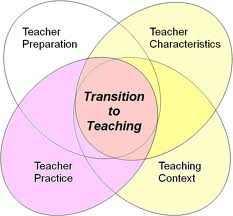It's when the seeds are planted so deeply, so early, that career educators are made. Knowing from an early age that one wants to make a difference in the lives of children, just as a teacher made a difference in one's own life, tends to guide one toward good decisions and away from bad ones.
But, as they say, something changed between once-upon-a-time and nowadays. Today, children in classrooms see how little respect is given to teachers. High school students, particularly, see the great economic disparity between the student parking lot and the faculty parking lot -- check it out for yourself sometime, as teenage students roll up in gleaming new SUVs and luxury sedans, and teachers arrive in their beaters -- and understand instantly that teaching isn't a lucrative career option. And after watching their teachers weighed down with greater workloads, larger class sizes, more command-and-control from district and state administrators, more federal regulation of the classroom and shrinking salaries and benefits -- not to mention the significant hateful rhetoric pointed at teachers from media -- a generation of potential Miss Brookses have found other professional paths to pursue.
Which leaves tremendous gaps in the profession. Veteran educators approach retirement eligibility and either transition to returning-retirees or leave the field altogether. Those mid-career educators who remain in the classroom -- too many years in the system to give up on, not enough yet to earn the freedom to make other choices -- feel the weight shifted to their shoulders.
Gaps at the starting gate, as fewer young men and women seek to enter the profession as a career, are being filled by resume-builders through programs like Teach for America -- or, as I call it, Teach for A While. These programs offer Ivy-League graduates something akin to a Peace Corps experience: Take five weeks of "You Too Can Teach" training and then a teaching assignment in a low-rent community for two years before joining your uncle's firm or brokerage -- or, as in the case of Michelle Rhee and others like her, parlay that experience into a high-paying administration job.
But between the lifers and the not-on-your-lifers is another huge gap. WLTX of Columbia aired a report this week describing a local program that seeks to fill this one.
Ever thought of changing your career? The South Carolina Department of Education is training non-traditional teachers.
It's part of what's known as the PACE Program, and it's changing the lives of new teachers and students.
Adam Speight wanted to make a career change. "I worked in marketing and add agencies for a couple years," he explained.
Speight is participating in PACE, which lasts three years and allows professionals to transition from the workplace to the classroom. Training sessions are filled with former marine biologists, lawyers, and engineers.
"You realize you are making a better future," Speight said. "I know it sounds cheesy but it's true."
He said moving out of the office and into the classroom is a easier than you think.
"You know what to emphasize and what to downplay," he said. "What's important, what's not."
While working in advertising Speight taught a class at USC.
"I had a student tell me they learned more from my class than they did in all their four years," he said.
State Education Superintendent Mick Zais said these new teachers bring a diversity of experience and background to the classroom.
"These folks have the ability to change childrens lives and I admire their decision," Zais said.
Speight is now at Chapin High School teaching entrepreneurship and marketing.
"It gives you credibility with the students because they know that you lived the material," Speight said.
Pace educators say they can put material more in context and bring the subject alive.
"Students are telling me how much I'm going to like reading their papers and they are really proud of the work they do, and work they thought they couldn't do," he said. "That's nice, that's a good feeling.
Professionals from other fields who transition into the classroom certainly bring maturity and probably a depth of knowledge about particular topics. But do you think we'll ever rebuild a culture that respects educators and their profession so much that little children will want to become teachers from the start, and parents will encourage their children to consider teaching as a career? Or are we locked into a culture that regards teaching as a second career or just a fallback position?

No comments:
Post a Comment